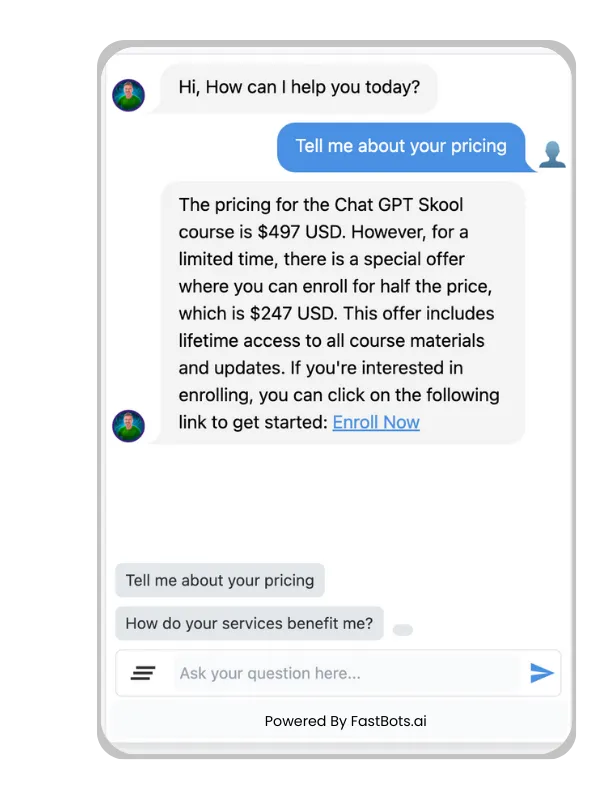Choosing the right WhatsApp CRM for your business can significantly streamline your communication workflows, enhance customer experiences, and ultimately boost sales. With an array of options available on the market, it is essential to select a CRM that aligns with your specific needs and requirements. In this article, we will walk you through the critical factors to consider when making your decision.
Before diving into individual CRM options, it is crucial to understand your business's unique communication challenges and the role a WhatsApp CRM will play in addressing them. This will provide a clear foundation for determining the features and integrations that are most important to your organisation. Additionally, it is essential to factor in your budget and available resources, as this may influence the CRM choice.
Having a well-defined strategy in place will make it easier to select a CRM that not only integrates seamlessly with WhatsApp but also supports your long-term business objectives. As you explore different CRM options, it is vital to evaluate each one's capabilities in terms of customer management, interaction tracking, and reporting to ensure they meet your needs and expectations.
Understanding CRM integration with WhatsApp
The Role of CRM in Customer Communications
Customer Relationship Management (CRM) systems play a crucial role in streamlining your customer communications. They efficiently organise and manage customer data, interactions, and history, helping you provide personalised and targeted services. Choosing the right CRM is vital for your business, and integrating it with the widely used messaging platform, WhatsApp, can bring significant benefits.
Benefits of Using WhatsApp as a CRM Channel
1. Wider reach: WhatsApp is used by over 2 billion individuals worldwide, enabling your business to connect with a vast audience of potential customers.
2. Improved customer engagement: Customers can easily reach your business through a familiar platform, resulting in a seamless and engaging communication experience.
3. Real-time support: WhatsApp's instant messaging capability offers real-time support, resolving customer queries and complaints more efficiently.
4. Automated responses: WhatsApp CRMs often include chatbots to handle simple tasks and deliver instant automated responses, freeing up your support staff to focus on more complex issues.
5. Cost-effective: Given that WhatsApp is free to use, it serves as a cost-effective communication channel compared to traditional methods like phone calls and SMS.
To ensure you reap these benefits, it's essential to choose the right CRM for your needs. Some key aspects to consider when selecting your WhatsApp CRM:
- Business requirements: Assess your specific needs in terms of communication, customer data management, and the volume of inquiries you handle.
- Integration capabilities: Ensure your chosen CRM can smoothly integrate with your existing systems and supports WhatsApp Business through an API or other similar methods.
- Budget and resources: Consider the affordability of the CRM system, training and onboarding expenses, and the resources required for implementation and maintenance.
Make sure you evaluate multiple CRM providers and their features to determine the CRM that best suits your business needs, budget, and goals. By doing so, you'll enhance your customer communication strategy and elevate your business to new heights.
BUILD YOUR OWN WHATSAPP CHATBOT
In less than 5 minutes, you could have an AI chatbot fully trained on your business data assisting your Website visitors.
Essential features of a WhatsApp CRM
When choosing a WhatsApp CRM, it's crucial to consider essential features that can help streamline your business processes and improve customer relations. The following sections outline some important aspects to consider before making your decision.
Contact Management
One of the most critical aspects of a WhatsApp CRM is contact management. Your chosen platform should provide a centralised database for storing and organising customer information. This may include:
- Easy import and export of contact data
- Segmentation of contacts based on various criteria (e.g., location, purchase history)
- Customisable fields for capturing specific customer details
A well-designed contact management system allows you and your team to access relevant customer information quickly, ensuring that interactions are personalised and efficient.
Message Automation
Message automation is another vital feature of a WhatsApp CRM, as it can help to scale your communication efforts without increasing the burden on your team. Look for a platform that offers:
- AI-powered chatbots for handling common inquiries
- Auto-response features for messages received outside of business hours
- Templates and quick replies for frequently asked questions
By incorporating message automation, you'll be able to provide instant answers to customer queries and free up your team to focus on more complex interactions, ultimately enhancing the customer experience.
Sales pipeline integration
Finally, consider a WhatsApp CRM with sales pipeline integration to streamline your sales process and improve collaboration between teams. Essential elements that indicate strong sales pipeline integration include:
- Seamless integration with your existing CRM software
- Real-time updates on customer interactions and lead status
- Customisable pipelines that match your unique sales process
By choosing a WhatsApp CRM with these features, you'll be able to boost your sales team's efficiency, ensuring that leads are accurately tracked, nurtured, and converted throughout the sales process.
Evaluating Vendors for WhatsApp CRM Solutions
When choosing the right WhatsApp CRM for your business, it's crucial to consider certain factors in your evaluation process.
Vendor Reputation and Reliability
Make sure to research and consider the reputation of each vendor on your shortlist. Look for:
- Customer reviews and testimonials
- Awards or industry recognition
- Established record of success and customer satisfaction
Also, evaluate their reliability in terms of:
- Uptime and performance: ensure the platform meets SLA (Service Level Agreement) standards.
- Scalability: as your business grows, the CRM should be able to handle the increasing volume of conversations.
Technical support and training
A great CRM vendor should provide comprehensive technical support and training to help you get the most out of their solution. Consider the following factors:
- Availability of customer support: 24/7 support, different support channels (e.g., email, chat, phone)
- Documentation and knowledge base: detailed, up-to-date resources explaining how to use all CRM features
- Training programmes: vendor-offered workshops, webinars, or training sessions to educate your team on using the platform effectively.
Compliance and security
Finally, prioritise compliance and security when evaluating vendors. Make sure they adhere to the necessary standards and regulations, such as:
- GDPR: protecting your customers' personal data
- Data encryption: safeguarding data transmission and storage
- Secure access: role-based permissions and authentication
Keep these factors in mind while evaluating vendors for your WhatsApp CRM solutions, and you'll be well on your way to identifying a reliable partner that supports your specific needs.
Implementation Strategies
In this section, we will discuss three important aspects of implementing a WhatsApp CRM: data migration, staff training, and workflow customisation.
Data Migration
When transitioning to a new WhatsApp CRM, it's crucial to ensure seamless migration of your existing customer data. Here are a few steps to follow:
1. Identify the data. Review your existing customer data and determine which information should be migrated to the new CRM.
2. Choose the export method. Select an appropriate data export method, such as CSV, XLS, or XML files. Some CRMs may also support API-based data transfers.
3. Clean up the data. Before importing, remove duplicate entries and correct any inconsistent or erroneous data.
4. Test the import: Conduct a trial import with a subset of your data to verify that data is accurately transferred into the new system.
5. Validate the data. Once imported, cross-check the information in the WhatsApp CRM against your original data to ensure accuracy and completeness.
Staff Training
In order to maximise the benefits of your new WhatsApp CRM, it's essential to provide adequate staff training. Consider these training methods:
- Interactive workshops: Conduct hands-on workshops for employees to experience the CRM's features and functionalities first-hand.
- Guided tutorials: Utilise tutorial videos or articles provided by the CRM vendor to help your staff become familiar with the system.
- Peer support: Assign experienced staff members to mentor and support others who may be struggling with the new system.
Ensure that staff training covers these key areas:
1. Navigating the CRM and understanding its features.
2. Integrating WhatsApp with the CRM, including message templates, auto-responders, and chatbots.
3. Managing customer communication and records within the CRM efficiently.
Workflow Customisation
To improve productivity and cater to your business's unique requirements, customise the CRM's workflow as needed. Here are some aspects to consider:
1. Contact organisation: Configure your CRM to categorise contacts as per your specific needs, such as by lead status, product use, geographic location, etc.
2. Task automation: Streamline your processes by automating repetitive tasks such as WhatsApp message sending, reminders, and contact updates.
3. Reporting: Tailor reporting features to provide insights relevant to your business's goals and performance indicators.
With a proper focus on data migration, staff training, and workflow customisation, you'll be well-equipped to make the most of your chosen WhatsApp CRM system.

Maximising the ROI of Your WhatsApp CRM
Monitoring Performance Metrics
To maximise the return on investment (ROI) of your WhatsApp CRM, it is essential to monitor performance metrics. Track important indicators such as response time, conversation length, and customer satisfaction ratings. By routinely analysing these metrics, you can identify areas for improvement and adapt your strategies accordingly. For instance:
- Improve customer service by reducing response time.
- Increase customer satisfaction by tailoring messages to their needs.
- Enhance efficiency by automating frequently asked questions.
Leveraging AI for Enhanced Customer Interactions
In order to stay competitive, integrating artificial intelligence (AI) into your CRM can prove beneficial. AI-powered chatbots can enhance customer interactions by providing faster, personalised responses. Here are some ways AI can improve your WhatsApp CRM experience:
1. Quick response: Artificial intelligence reduces wait times by providing instant answers to common queries.
2. Personalisation: AI can analyse customer data and preferences to create tailored messages, enhancing the customer experience.
3. 24/7 availability: Chatbots are available around the clock, providing continuous support to customers.
Continuous Improvement and Updates
Lastly, prioritising continuous improvement and updates will boost your WhatsApp CRM's ROI. Regularly update your CRM to access the latest features and capabilities. Stay informed about industry trends and innovations to maintain a competitive edge. Implement the following strategies for continuous improvement:
- User feedback: Obtain user feedback to identify areas for improvement and adjust your CRM strategies accordingly.
- Regular training: Provide training to staff members to optimise CRM usage and maintain consistent customer service.
- System updates: Keep your WhatsApp CRM updated to make use of the latest features and best practices.
By focusing on monitoring performance metrics, leveraging AI for enhanced customer interactions, and embracing continuous improvement, you can maximise the ROI of your WhatsApp CRM and drive business success.
Frequently Asked Questions
What factors should be considered when selecting a CRM with WhatsApp integration?
What are the advantages of incorporating the WhatsApp Business API into a CRM system?
How does HubSpot's CRM platform facilitate integration with WhatsApp?
Can you outline the steps for integrating WhatsApp messaging with Zoho CRM?
1. Subscribe to a service like Twilio that offers a WhatsApp API.
2. Create a webhook in Zoho CRM to handle incoming messages.
3. Configure the API to link with your CRM system, providing the necessary access credentials.
4. Set up automated workflows in Zoho CRM to manage and respond to WhatsApp messages.
What are the key features to look for in a third-party WhatsApp business application?
How do you effectively manage customer interactions using WhatsApp in a CRM environment?
THE FAST WAY TO BUILD YOUR OWN WHATSAPP AI CHATBOT
In less than 5 minutes, you could have an AI chatbot fully trained on your business data assisting your Website visitors.


